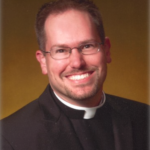7/14/2023
Parables: the Antidote to Polarization?
 Fr. Rich Andre, CSP
Fr. Rich Andre, CSP
July 14, 2023
 Fr. Rich Andre, CSP
Fr. Rich Andre, CSP
July 14, 2023
Over the weekends of July 16, 23, and 30, we’ll hear Jesus’ seven parables in the 13th chapter of Matthew about the kingdom of heaven. We often forget how surprising these stories are. Here are some alternate endings that we may have expected the first time we heard these parables:
Like the seeds scattered on good soil, our contemplation of this chapter may yield 30-, 60-, or 100-fold if we place it in the context of Matthew’s larger narrative.
Matthew’s gospel can be divided into two major parts. In the first part, despite opposition from some political and religious leaders, Jesus tries to work within existing structures to spread his salvific message. Things come to a head at the end of chapter 12, when some Pharisees accuse Jesus of being in league with the demon Beelzebul. The Pharisees’ accusation would have resonated strongly with Matthew’s community of Jewish Christians, because some Pharisees had probably accused them of being in league with Satan, too!
In the second part of Matthew, starting with Jesus’ parables about the kingdom of heaven, the disciples form a community separate from those who oppose Jesus. But rather than preaching about separation, Jesus speaks to his disciples about love, mercy, and abundance. The parables of chapter 13 echo a theme throughout Matthew. Both trees and people can produce good fruit or rotten fruit. The kingdom of heaven is like a field that produces both wheat and weeds, or like a net that catches both good and rotten fish. But it is not the job of the members of Matthew’s community to determine which people belong to the kingdom of heaven and which ones belong to the kingdom of Satan.
In our current climate of toxic polarization, so many of us are quick to decide if a stranger is one of “us” or one of “them” when it comes to political or church leanings. Plenty of Americans are accusing people who disagree with them of being in league with Satan! But when we resort to vilifying one another, I don’t think any of us are building the kingdom of heaven. Jesus is clear: none of us have the ability to accurately determine who will be wheat and who will be a weed at the end of the journey.
And this ties in with other parables in chapter 13. A tiny amount of yeast – almost impossible to see among nearly nine gallons of flour – allows all the dough to rise, to feed over 100 people. Mustard seeds are miniscule things, and no one in Jesus’ world ever saw a 10-foot mustard plant, let alone one that could support a bird’s nest. Each of us has the potential to build up the kingdom of heaven.
In chapters 14 and 15 of Matthew, Jesus challenges the disciples – and through them, all of us – to build up a kingdom of abundant love and mercy, not a kingdom of division. With no more faith than a tiny bit of yeast, anyone can walk on water. Caring for a non-believer’s child takes nothing away from the community of believers. If we don’t think that we can give others the benefit of the doubt, we only need to ask the Holy Spirit for faith the size of a mustard seed.
The kingdom of heaven will likely accommodate Sadducees, Pharisees, zealots, and Herodians. Right-wing conservatives, left-wing liberals, and everyone in between. Our job is to live out the Beatitudes. God will evaluate each of us at the end of the age by the fruits that we produce, not by whom we prevented from producing their own fruits.